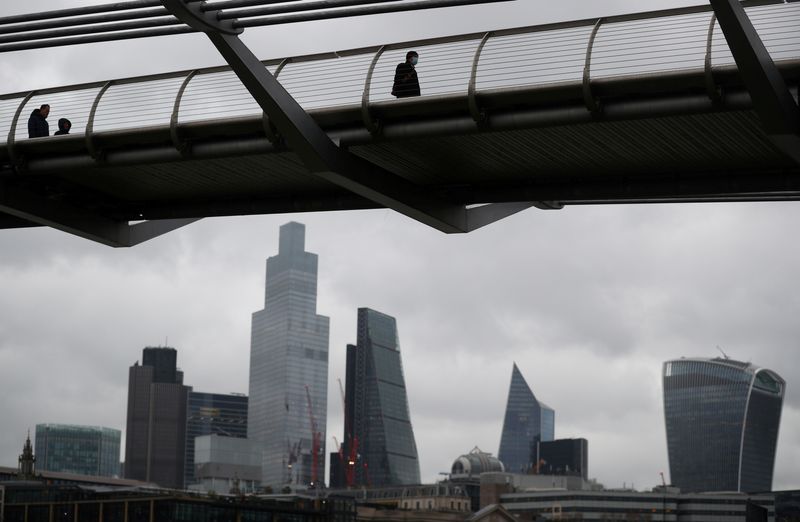By William Schomberg and David Milliken
LONDON (Reuters) -Britain's economy shrank in the three months to September at the start of what is likely to be a lengthy recession, underscoring the challenge for finance minister Jeremy Hunt as he prepares to raise taxes and cut spending next week.
Economic output shrank by 0.2% in the third quarter, less than the 0.5% contraction analysts had forecast in a Reuters poll, Friday's official data showed.
But it was the first fall in gross domestic product since the start of 2021, when Britain was still under tight coronavirus restrictions, as households and businesses struggle with a severe cost-of-living crisis.
Britain's economy is now further below its pre-pandemic size - it is the only Group of Seven economy yet to recover fully from the COVID slump - and is smaller than it was three years ago on a calendar-quarter basis.
The Resolution Foundation think tank said that although the fall was smaller than investors had feared, it left Britain on course for its fastest return to recession since the mid-1970s.
Its research director James Smith said the figures provided a sobering backdrop for Hunt's Nov. 17 budget announcement, when he will try to convince investors that Britain can fix its public finances - and its credibility on economic policy - after Liz Truss's brief spell as prime minister.
"The Chancellor will need to strike a balance between putting the public finances on a sustainable footing, without making the cost-of-living crisis even worse, or hitting already stretched public services," Smith said.
Responding to the data, Hunt repeated his warnings that tough decisions on tax and spending would be needed.
"I am under no illusion that there is a tough road ahead - one which will require extremely difficult decisions to restore confidence and economic stability," Hunt said in a statement.
"But to achieve long-term, sustainable growth, we need to grip inflation, balance the books and get debt falling," he added. "There is no other way."
RECESSION REALITY
The Bank of England said last week that Britain's economy was set to go into a recession that would last two years if interest rates were to rise as much as investors had been pricing.
Even without further rate hikes, the economy would shrink in five of the six quarters until the end of 2023, it said.
"Fears of a recession are turning into reality," Suren Thiru, economics director for the Institute of Chartered Accountants in England and Wales, said.
"This fall in output is the start of a punishing period as higher inflation, energy bills and interest rates clobber incomes, pushing us into a technical recession from the end of this year."
In September alone, when the funeral of Queen Elizabeth was marked with a one-off public holiday that shut many businesses, Britain's economy shrank by 0.6%, the Office for National Statistics said. That was a bigger monthly fall than a median forecast for a 0.4% contraction in the Reuters poll and the largest since January 2021, when there was a COVID-19 lockdown.

But gross domestic product data for August was revised to show a marginal 0.1% contraction compared with an original reading of a 0.3% shrinkage, and GDP in July was now seen as having grown by 0.3%, up from a previous estimate of 0.1%.
The upward revisions to July and August's GDP data mostly reflected new, quarterly figures on health and education output, alongside some stronger readings from the professional and scientific and wholesale and retail sectors, the ONS said.